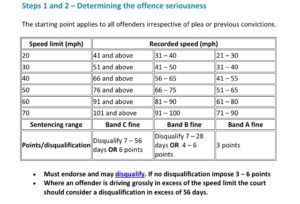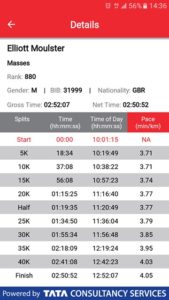Monthly Archives: April 2017
 Over the weekend our Trainee Solicitor Elliott Moulster successfully ran the 2017 Virgin Money London Marathon. The Marathon was a 26.2 miles run across the heart of Central London. This year it was ‘enjoyed’ by a record number of people. In total, there were almost 40,000 runners of every age and ability, each with their own reason to run.
Over the weekend our Trainee Solicitor Elliott Moulster successfully ran the 2017 Virgin Money London Marathon. The Marathon was a 26.2 miles run across the heart of Central London. This year it was ‘enjoyed’ by a record number of people. In total, there were almost 40,000 runners of every age and ability, each with their own reason to run.
First London Marathon
Although Elliott had never run the London Marathon before, it was a challenge that he was somewhat familiar with having completed the Nottingham Robin Hood Marathon on two previous occasions.
 During the first occasion, which he ran for charity, Elliott was able to secure a ‘good for age’ time under 3:00:05. This achievement meant that he was able to obtain automatic entry for the London Marathon. This was opposed to entry through the formidable public ballot which can only accept roughly 1/5 of all applicants due to the sheer volume of demand.
During the first occasion, which he ran for charity, Elliott was able to secure a ‘good for age’ time under 3:00:05. This achievement meant that he was able to obtain automatic entry for the London Marathon. This was opposed to entry through the formidable public ballot which can only accept roughly 1/5 of all applicants due to the sheer volume of demand.
As this was his first Marathon since starting his training with the firm, preperation for the occasion proved to be somewhat challenging. With daily work in the firm’s Regulatory Law department, and his additional commitments including:
- Police Station Accreditation
all taking priority, time to go out running for hours on end was often sparse.
Placed 880th out of 40 000
Notwithstanding this challenge, it appears that he is managing these commitments extremely well. He passed the finish line of the London Marathon with a new personal best of 02:50:50. This time saw him finish 880th out of the 40 000 who entered.
He could not have done this without the support of his friends and family. Their encouragement at mile 23 saw him through ‘the wall’ that he hit towards the end of the race. With hindsight this was probably self-induced due to his erratic pace at the start of the race!
Overall, he is pleased to that it was an amazing experience and one that he looks forward to repeating in the future, albeit in an even quicker time!
Monthly Archives: April 2017

Prison law specialist and departmental manager Irene Tolley secured a transfer to open conditions directly from the high security estate in a very complicated case before the parole board.
Her client had originally been serving a life sentence for an allegation of conspiracy to murder. The minimum term imposed in 2009 was one of 17 years.
He had initially been a Category A prisoner. Irene had earlier been successful in persuading the Category A board that his categorisation be downgraded to Category B.
Irene’s client had maintained his innocence in relation to the allegation of conspiracy to murder so he appealed the conviction. The Court of Appeal directed a re-trial and he was acquitted. Although appeals against conviction for the robbery matters were refused, a sentence of Imprisonment for Public Protection was imposed instead with a minimum term of 7 years.
Oral hearing before the Parole Board
Immediately following the successful appeal, Irene made representations that her client needed the benefit of an oral hearing. Because of the complications his case should not be dealt with as a paper review.
She requested that his oral hearing be brought forward to take into account a significantly reduced minimum term. As a result, his oral hearing was heard just a fortnight after the expiry of his tariff.
Joint Representation with Queen’s Counsel
As the history of the case was complicated, Irene contacted counsel James Wood QC because he had undertaken the successful appeal on behalf of her client. Irene had worked with counsel on many occasions over a 30 year career in criminal representation and prison law. As a result he agreed to jointly represent their client at the oral hearing.
Neither release or open conditions were supported by the offender supervisor, offender manager or psychologist. Application was made on his behalf for release despite the fact that our client was still in the high security estate. The report writers were of the view however he ought to remain in closed conditions in the Category B estate.
Full argument was made to the panel on his behalf, with additional argument that if the panel did not agree with release he still ought to be moved to Category D open conditions.
Recommendation of move to open conditions
After argument from both lawyers the parole board decided to recommend a move to open conditions. This has now been approved by the Secretary of State. A further review was set for 15 months time to allow for resettlement and further risk assessment. Bearing in mind his good progress in prison so far, despite his sense of injustice, it appears likely that following compliance he will be released following the next review.
Appropriate representation and argument was provided on behalf of our client by both Irene and Queen’s Counsel. He was very pleased with the result.
Contact prison law specialist Irene Tolley
If a friend or family member needs advice in relation to any aspect of prison law then please contact us. Legal aid is still available for many aspects of prison law including parole board hearings. If legal aid is no longer available then we will discuss the possibility of representation under an affordable fixed fee.
Irene can be contacted on 0115 9599550 or you can use the form below to contact us.
Contact - Prison Law
Monthly Archives: April 2017
The new sentencing guidelines as they apply to speeding offences have been receiving some publicity. The reports have highlighted the increase in the level of fine that can be imposed for the most serious examples of speeding that appear before the Magistrates’ Court.
The penalties involve maximum fines of £1,000 or £2,500 if the offence is committed on the motorway.
Nottingham motoring law solicitor Graham Heathcote spoke to BBC Radio Nottingham on 24 April 2017. You can listen to the interview here:
You can begin to work out the starting point for your particular case by looking at where you fall within the bands.
Band A
This covers low level speeding. It will result in three points and a fine of up to 50% of your weekly income. It applies if you are driving up to 30mph in a 20mph zone; up to 40mph in a 30mph zone; 55mph in a 40mph zone; 65 in a 50; 80 in a 60, and; up to 90mph in a 70mph zone.
Band B
This will attract a driving ban of 7 – 28 days will or four to six penalty points. This punishment will be imposed with a fine of up to 100% of your weekly income.
It covers more serious speeding – 31mph to 40mph in a 20mph zone; 41mph to 50mph in a 30 zone; 56mph to 65mph in a 40; 66 to 75 in a 50; 81-90 in a 60, and; 91mph to 100mph in a 70mph.
Band C
This sentencing range is reserved for the most serious speeding offences. The court will consider a driving ban of between 7 and 56 days or impose six penalty points. This could be coupled with a fine up to 150% of weekly income.
This covers speeds of over 41mph in a 20mph zone; 51mph in a 30mph zone; 66mph in a 40mph zone; 76mph in a 50mph; 91mph in a 60mph, and; 100mph in a 70mph zone.

A change in emphasis for mid-range speeding offences?
The guideline for Band B offences appears to be a change of emphasis in relation to the starting point. It is unlikely to be an error in drafting that suggests that the Magistrates’ should first consider a driving ban and then look at penalty points as an alternative.
We will have to wait and see whether the courts’ interpretation of the guidelines results in more motorists receiving short discretionary disqualifications. We know that the effect of such a driving ban may well be disproportionate to the time that it is in force.
The net effect of these guidelines might effect many more motorists. Those who break the limit by miscalculation rather than recklessness, now face a real risk of ending up off the road. The consequences can go beyond the simple ban, including a massive hike in future insurance premiums.
Aggravating Factors
The table above show the starting point for speeding offences before the court. The fine and whether there is a disqualification or points will defend on the aggravating and mitigating factors in any case.
The guideline features a non-exhaustive list of factors that may increase serious and therefore the financial penalty as well as increase the chances of receiving a disqualification. These include:
- Previous convictions
- Offence committed whilst on bail
- Offence committed on licence or post sentence supervision
- Poor road or weather conditions
- Driving LGV, HGV, PSV etc.
- Towing caravan/trailer
- Carrying passengers or heavy load
- Driving for hire or reward
- Evidence of unacceptable standard of driving over and above speed
- Location e.g. near school
- High level of traffic or pedestrians in the vicinity
Mitigation
Some aspects of the case might reduce seriousness and therefore the penalty imposed such as:
- No previous convictions or no relevant/recent convictions
- Good character and/or exemplary conduct
- Genuine emergency established
Net effect, many more motorists, who break the limit by miscalculation rather than recklessness, now face a real risk of ending up off the road. The consequences can go beyond the simple ban, including a massive hike in future insurance premiums.
Ring now, 0115 9599550, and get us on your side.
Contract a Motoring Law Specialist

We appreciate that your driving licence will be important to you. You may receive a notification that the police are considering a prosecution. You might be told that you have a court date.
Here at VHS Fletchers we have an experienced team of motoring lawyers, with extensive experience in what can be a complex area of the law, providing technically sound, clear advice and with a proven track record of saving motorists’ driving licences.
Please contact Graham Heathcote on 0115 9599550 or contact him using the form below for advice and an estimate of our fees.
Contact
Monthly Archives: April 2017
If you are going to Glastonbury, Reading, Leeds or any other festival this summer, please take note! Because of changes in the law you need to leave your pyrotechnic articles at home!
Flares banned at festivals
Music festivals are following in the footsteps of football matches as a new law took effect from 3 April 2017. This banned the use of pyrotechnics at music festivals. Section 134 of the Policing and Crime Act 2017 states that anyone caught with a “pyrotechnic article” at a “qualifying musical event” in England or Wales could face up to three months in prison and/or a fine.
While many believe that pyrotechnics and flares contribute to the atmosphere of an event, it is difficult to argue with how dangerous they are, particularly in a crowd. The law follows considerable public demand in 2016 because of anecdotes of serious burns and panic attacks brought on by smoke.
The background can be found here.
The risk at festivals such as Glastonbury is obvious because of the amount of heat and smoke that it gave off. From a distance they may look spectacular but it could only be a matter of time before somebody is seriously injured. The law is moving to prevent that because of this.
Pyrotechnic Articles
This is defined as “an article that contains explosive substances, or an explosive mixture of substances, designed to produce heat, light, sound, gas or smoke, or a combination of such effects, through self-sustained exothermic chemical reactions.” It does not includes matches. It was, however, specifically designed to include flares, fireworks and smoke bombs.
Qualifying Music Festival
This is a music festival licensed under the Licencing Act 2003 so if in doubt you can safely assume that all major festivals are included.
There are no sentencing guidelines yet published for this offence because it is new legislation. It should be noted however that the maximum sentence is identical to that for entering a football ground with a firework unders.2A of The Sporting Events (Control of Alcohol etc.) Act 1985. Offences under that legislation regularly attract custodial sentences and we should expect the courts to react in the same way for the new offence.
If you are not going to a festival or football match it is still legal to possess fireworks, as long as you are over 18.
Effective policing?
There is a difficulty in enforcing the law at a festival compared to a football ground. Police will struggle to enter a festival crowd, particularly near the front. Also, the crowd isn’t monitored on CCTV as it is at football. So most arrests for possessing pyrotechnic articles are likely to come at the festival gates, as with drugs.
Contact us for further advice
If you have any queries about the legislation or if you are accused of having pyrotechnic articles at a qualifying event please contact one of our expert criminal law solicitors at your nearest office. Details can be found here.
Alternatively you can contact us using the form below.
Contact
Monthly Archives: April 2017
Many people have a pre-conceived idea as to what solicitors do. They sit behind desks, see clients and then write letters trying to get what their client wants. It is assumed this simply repeats itself every day. This couldn’t be further from the truth, however, for criminal solicitors. Each day they attend the office with an idea of what the day should hold – perhaps appointments with clients, a number of court appearances or police station representation. Maybe some time has been set aside for preparation of a particular case.
Criminal solicitors deal with the unexpected
The reality is though that criminal solicitors have absolutely no idea what each day will bring. A new client contact the office may result in the need for any number of actions.
A person may need assistance with a road traffic case or a low value shoplifting. They may face an allegation of a serious sexual offence or assault involving life threatening injuries. No matter what the allegation criminal solicitors have to be prepared and adapt to how one new client may all of a sudden change their entire day.

Chesterfield Crime Solicitor Serena Simpson recently had to deal with the unexpected. She had a quiet day with no clients before the Court so was planning to use the day reducing items on her ‘to-do’ list.
In the event she received a phone call from the police. A client had been arrested for murder and she was required to attend the police station to provide advice and representation in interview.
Police are investigating a murder
From experience our staff know that an allegation of murder is likely to take many hours and in many cases days to resolve at the police station. Interviews can proceed through the night or into weekends. In such a pressurised situation we know that clients will benefit from seeing the same criminal defence lawyer throughout these interviews. As a result we will always take steps to ensure that a lawyer of appropriate experience can be present to advise for the entirety of the investigation state.
In this case Serena considered her diary for this and the next day and was able to re-allocate work. This left her free to commit to providing continuity of representation at the police station. This would mean that Serena would be working late but had no way to predict when she would finish. There was also the obvious impact on her family life as she wouldn’t be home until late. Any plans she had were cancelled.
Serena provided police station representation to her client into the late evening before returning home. She continued to be in communication with the police until later that night. The following morning she received an early call early requesting her immediate return to the police station for further interviews.
After many hours at the police station Serena’s client was released without charge. There was no cost to him as police station representation is free to anyone being interviewed in the police station.
Finally, Serena was able to return to the tasks she had planned two days earlier, whilst waiting to see which client with what offence would next need her assistance.
Contact us for dedicated police station representation
All of our staff strive to offer the best service to our clients. This is illustrated by the steps Serena took so that she could provide police station representation throughout this case.
Our 24 hour emergency service means that if you require legal advice on any criminal matter, whatever the time of day or night, and seek a solicitor who provides you with the client care that you need then please telephone your local office to speak to a criminal defence lawyer.
Chesterfield Crime Solicitors VHS Fletchers can be called on 01246 283000. Alternatively you can contact any of our solicitors using the form below.
Contact
Monthly Archives: April 2017

Although previously linked with VHS Fletchers as a consultant, we are pleased to announce that Chesterfield crime solicitor and protest law specialist Gavin Haigh is now an employed member of our criminal team.
Gavin prides himself on his meticulous attention to detail. His robust defence of clients on all matters makes him a formidable advocate and police station representative. Gavin is not shy to raise objections when required and forcefully protect his client’s rights at all times.
Specialist in Protest Law
Gavin has been a qualified solicitor and Duty Solicitor for 12 years and during that period he has has found a particular interest and specialism in the criminal law as it affects protests and marches.
This can involve advice on:
- the policing of university protests
- the policing of political protests
- advising on general animal welfare issues
- providing advice relating to environmental protests including recent advice relating to anti-fracking protests
Gavin has represented clients interviewed or charged as a result of their alleged activities including anti-fur demonstrations and hunt monitoring. This is an area of law where solicitors are instructed as a result of word of mouth and the trust that is built on previous client representation. As a result the continued instruction of Gavin is a ringing endorsement of his abilities.
Unique flexible appointments for our clients
Although Gavin will be based in our Chesterfield office, his flexible working arrangements will bring additional benefits to our Derbyshire clients. Gavin is happy to offer appointments with clients and their witnesses outside normal office hours and outside the office setting.
This flexibility recognises that it is not always possible for people to easily make time away from work commitments to travel to see a solicitor during normal office hours. This service, along with his willingness to arrange appointments around our clients’ availability (such as in the evening or weekend) will further demonstrate our commitment to put our clients first. These are arrangement are, of course, in addition to our commitment to provide 24 hour emergency advice and representation.
It may be of significance to existing or potential clients that we are not aware of any other firm of criminal solicitors in Chesterfield offering a similar service.
Attention to detail and robust defence
Gavin prides himself on his meticulous attention to detail. His robust defence of clients on all matters makes him a formidable advocate and police station representative. Gavin is not shy to raise objections when required and forcefully protect his client’s rights at all times.
Contact Chesterfield Criminal Solicitor Gavin Haigh
If you face a police investigation or court proceedings for any offence and particularly allegations arising out of public protests protest law issues, then you can contact Chesterfield at our Chesterfield office on 01246 283000. Alternatively you can use the form below to email your enquiry to us.
Contact
Monthly Archives: April 2017
Nottingham criminal solicitor Alex Chapman recently demonstrated that VHS Fletchers are prepared to travel under free legal aid in Magistrates’ Court cases. This is because we want to ensure you receive continuity of legal representation in your case.
Alex recently travelled to Bromley Magistrates’ Court to represent a client from Nottingham because he was charged with three allegations of assault. One of them was racially aggravated.
Our client had never appeared before a court before and was understandably concerned about the outcome of his case. Despite his character, there was a real risk that he would receive a custodial sentence, particularly due to one of the charges being racially aggravated.
Alex’s client had been in London because he had to resolve an issue with his passport. He had, however, missed his coach home and had unwisely had a drink to pass the time. Our client ended up in an argument with his partner and then an altercation with shop staff and a member of the public.
He was extremely apologetic for his actions so had not disputed the alleged conduct . Our client knew that he had lost his good character and that this could have a major impact on his future but he was realistic in his expectation of a prison sentence.
Alex saw that his client was particularly concerned that he receive continuity of representation. It is perhaps always important that a client has the benefit of the same lawyer throughout the lifetime of his case. Although he was legally aided, Alex was able to commit to travelling to Bromley.
In the event the case was able to be concluded at a single hearing because we had full instructions. Guilty pleas were entered and then Alex offered mitigation on his client’s behalf. A brief probation assessment was carried out so his client was sentenced. Rather than a custodial sentence he received a community order.
Availability of Free Legal Aid for Criminal Cases
We will always assess whether you are entitled to free legal aid for Magistrates’ Court hearings. In this case the funding allowed us to provide free representation to our client some distance away.
Contact one of our criminal defence solicitors
We have several offices across the East Midlands, however we can provide nationwide advice and representation in police stations and at the Magistrates’ and Crown Court. Find your nearest office here or use the contact form below in order to instruct us.
Contact
Monthly Archives: April 2017
Nottingham crime solicitor Alex Chapman secured an acquittal for a client facing a charge of driving with excess alcohol. The trial was heard before Nottingham Magistrates’ Court.
The issue at trial was the correctness of the identification. A police officer out on patrol saw a vehicle driving with a faulty brake light so the officer drove alongside the vehicle and spoke to the driver.
In response, the driver then drove away around a corner at speed. This aroused the police officer’s suspicions so he followed the vehicle. By the time he caught up with the vehicle a few seconds later, the vehicle was stationary. There was now nobody in the driver’s seat.
Defending a charge of excess alcohol
One male was stood outside the vehicle. Two males were sat on the backseat. The police officer believed that he immediately recognised our client, one of the back seat passengers, as the driver of the vehicle. Because of this he asked him to provide a roadside breath test, which he failed. As a result he was arrested for driving with excess alcohol.
Alex’s client, a Polish national, insisted throughout that the officer had made a mistake. He claimed that one of the other males had been the driver.
The only issue in the case was the correctness of the identification. In order to convict the Magistrates would have to be sure that the officer had not made a mistake. If there was a reasonable doubt as to that, then Alex’s client would be found not guilty.
As a result, Alex directed all of his cross examination to showing that the necessary doubt was present. The officer admitted that he had spoken to the driver for less than three seconds. He accepted that it was dark at the time. Although there was street lighting, the driver was sat inside car. The interior light was not on so the inside of the car was in darkness.
Can you be ‘1 million per cent’ sure?
Alex showed the officer a photograph of his client’s friend. He had been the other male sat in the backseat at the time of the arrest. The photograph was taken on the night in question. The officer conceded that they looked very similar. He could not be moved, however, on the correctness of the identification. He continued to maintain that he was “one million percent sure” that Alex’s client had been the driver.
Our client gave evidence along with his friend. His friend’s evidence was that he had been the driver. He stated that he had been taking the car for a test drive and panicked when he saw the police because he did not have insurance. He acknowledged that he knew he was admitting an offence himself but told the court he could not let his friend be wrongly convicted.
The third male who had been outside the car was the owner of the vehicle. He also attended to give evidence and support our client’s case.
Turnbull Guidelines and Identification
The quality of identification as well as the weight to be placed upon it is governed by the case of R -v- Turnbull. Alex directed his closing speech to the Magistrates to dealing with these issues. Although the officer himself was sure of the correctness of his identification, a convincing witness can still be mistaken. Alex argued that in all of the circumstances the officer could have made a mistake.
This argument was supported by his client’s full cooperation and consistent denials of responsibility. His account was also corroborated by two other witnesses.
The Magistrates found that despite the police officer’s confidence, they could not be sure of the correctness of the identification. Alex’s client was found not guilty of excess alcohol. Because of this he was not subject to the driving disqualification that would have followed a conviction.
Legal aid available
Despite being in work, Alex’s client was able to receive legal aid to ensure his free representation before the Magistrates’ Court. This was particularly important in his case as he required the assistance of an interpreter. Had there not been legal aid, he would have had to fund not only the case but interpreter’s fees himself when he gave instructions.
We will always investigate your entitlement to legal aid so that you receive affordable advice.
Contact a Nottingham criminal defence solicitor
If you are under investigation by the police or face court proceedings you will want to instruct an expert. Call our Nottingham office on 0115 9599550 or contact us using the form below.
If one of our other offices is more convenient then you can find our contact details here.
Contact
Monthly Archives: April 2017

Mansfield crime solicitor Tim Haines secured another not guilty verdict for a client before Mansfield Magistrates’ Court despite agreed bad character evidence.
His client faced an allegation of going equipped to steal. He was stopped by the police walking home with a bag of tools. He was also in possession of a mini motor bike that did not work.
The police chose to arrest him. A radio check on our client’s record revealed convictions for dishonesty and going equipped offences.
Tim’s client had a defence that he was advised to provide in interview. He maintained that he had put his offending behind him. Instead he had been at a friend’s house trying to mend the mini motorbike. He was on his way home when stopped by the police.
The police office went to the trouble of producing a map of the route taken. This was intended to show that our client was not taking direct route. A statement had also been taken from a witness purporting to be an expert. The statement contained details of what crimes the tools could have been used for.
A clear trial strategy
Tim used his substantial experience as a trial advocate to decide a trial strategy. He was able to agree the prosecution evidence but comments that were simply opinion were removed by agreement. As a result, the Magistrates’ did not have the opportunity to hear ‘live’ evidence from a police officer.
Bad character evidence neutralised
The prosecution had also served an application to have bad character evidence before the Magistrates. Again, Tim’s experience meant that he accepted that there was no realistic challenge to this application. Instead, he planned how his client’s record could be used to his advantage.
Tim’s analysis of the record meant that he could point out to the Magistrates that his client had always pleaded guilty to crimes he had committed. He took any potential sting out of the prosecution cross examination of his client by having his client give evidence about his character at the outset. His client was then able to explain his past.
Strong closing speech
Tim was able to make a strong closing speech on behalf of his client because of his clear trial strategy. The Magistrates, in their reasons for find Tim’s client not guilty, mentioned that they had not relied upon the bad character evidence.
Tim’s client was naturally delighted by the outcome in the case.
Contact a Mansfield Criminal Defence Solicitor
Whether you face investigation by the police, or court proceedings, then you will want to instruct Tim Haines. He can be contacted on 01623 675816. Alternatively you can used the contact form below.
Contact
Monthly Archives: April 2017

Derby criminal solicitor advocate William Bennett secured a not guilty verdict for his client before Derby Crown Court. He successfully challenged expert evidence so a jury was unable to convict.
William’s client faced an allegation of possessing a Class A drug with intent to supply. The drug was cocaine so had he been convicted after trial he faced a likely sentence of four and a half years in prison.
Expert evidence scrutinised
The prosecution case was based almost entirely on the opinions of a police officer because the evidence needed interpreting for the jury. He had undertaken an ‘expert witness’ course to become an witness who could give expert evidence in drugs cases before the Crown Court. Cross-examination, however, established that he was far from expert.
In summary, his evidence was that the only explanation for our client to be in possession of approximately 6 grams of cocaine was that he intended to supply it. He relied on the purity of the drug found as well as a suggestion that cutting agents were found at our client’s place of work.
The purported “expert” was cross-examined robustly by William Bennett, however. During this detailed questioning the witness conceded that he had personally dealt with seizures of cocaine in powder form on only ten previous occasions. He further accepted that a “regular user” of cocaine may use up to 2g of cocaine in a weekend.
These concessions undermined the contention that the witness was any form of expert in the supply of cocaine, and supported the reasonable possibility that the drug was for personal use rather than supply.
Not guilty verdict
As a result the jury took only half an hour to find William’s client not guilty of the charge. Because of this he fell to be sentenced for just possession of the drug.
The case shows the importance of choosing an experienced advocate. They can scrutinise and challenge effectively the opinions of purported experts so that your best case can be put. Such a challenge is often particularly important where expert evidence is relied on in drugs cases.
Contact a Criminal Defence Advocate
Legal aid is available for the majority of criminal cases heard before the Crown Court so we will always investigate with you the most affordable way of funding your case.
William Bennett can be contacted on 01332 546818 but alternatively you can email him using the form below.


